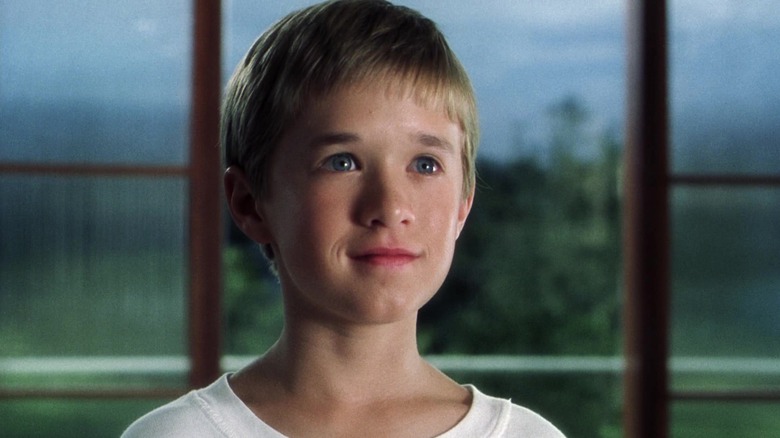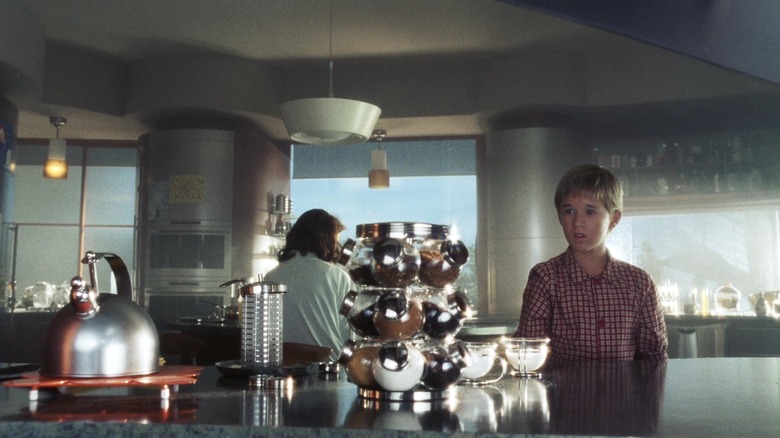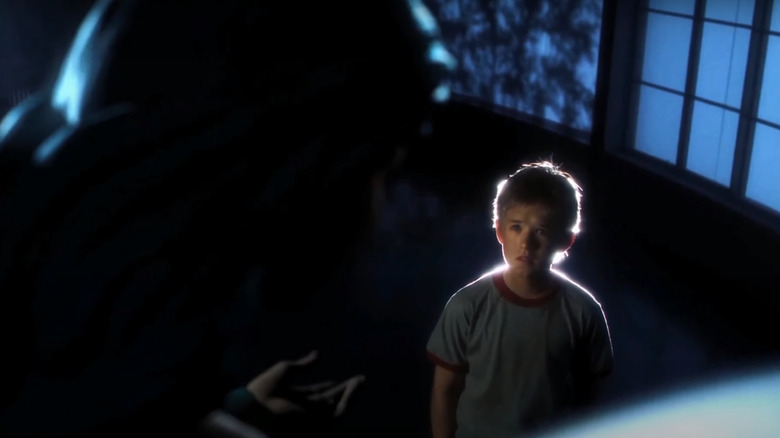Steven Spielberg's Divisive Ending For A.I. Artificial Intelligence Was Stanley Kubrick's Original 'Vision'
Before he died in 1999, Stanley Kubrick had grand plans for multiple films, including his retelling of Napoleon Bonaparte's life that would have seen none other than Jack Nicholson in the title role. But for me, his long-gestating adaptation of British author Brian Aldiss's short story "Supertoys Last All Summer Long" was a much more interesting project — simply because it demonstrated Kubrick's remarkable prescience through his fascination with artificial intelligence back in the '70s.
The way things played out, Kubrick never made his "Supertoys," handing off directing duties to Steven Spielberg before his death. This is a shame because while Spielberg's attempt at bringing the story to the screen is mostly well-respected, I always felt the full Kubrick treatment would have yielded a genuine masterpiece.
As it stands, we have 2001's "A.I. Artificial Intelligence." Set in a climate change-ravaged 22nd century, the movie follows David (Haley Joel Osment), an android — or "Mecha" — with the physical characteristics of a young boy and the unique ability to love. He's taken in by a couple, before being cast out and venturing on a journey to discover his place in the world and become a "real boy."
Fittingly, Kubrick reportedly liked to refer to the story as "Pinnochio." He had worked on developing it since 1973 and it took right up until his death to get the VFX and screenplay anywhere near ready, while Kubrick frequently turned his attention to other projects. In one instance, the director even used a dishonest contract trick to get out of shooting the "Supertoys" adaptation to work on "The Shining."
That ultimately meant Spielberg was the man for the job. And according to the "Jurassic Park" director, he stayed remarkably true to Kubrick's original vision, despite being accused of doing the opposite.
Adding sugar to Kubrick's wine
After Stanley Kubrick died, Brian Aldiss helped keep the project alive by writing a continuation of his short story "Supertoys." Steven Spielberg "almost immediately bought it." When the author saw the film, he was impressed but echoed a wider sentiment — that the director had added a little too much of his Spielbergian optimism to "A.I. Artificial Intelligence." The ending in particular was deemed divisive, in that it shows David (Haley Joel Osment) spending an ideal final day with his adoptive mother, in an apparent subversion of the typical Kubrickian bleakness.
Aldiss called the "A.I." ending "overly sympathetic" and opined that Spielberg had "[added] some sugar to Kubrick's wine." Elsewhere, in his 2015 Movie Guide, film critic and historian Leonard Maltin highlighted the "curious and uncomfortable hybrid of Kubrick and Spielberg sensibilities." But perhaps the most damning take came from critic Mick LaSalle, who maintained that "A.I." contained "the structureless, meandering, slow-motion endlessness of Kubrick combined with the fuzzy, cuddly mindlessness of Spielberg."
However, if you ask Spielberg, these criticisms have got it all backward. In an interview, the "A.I." director explained how the "cuddly mindlessness" wasn't entirely his doing:
"People assume that [Kubrick] ended 'A.I.' with David and Teddy underwater trapped by the ferris wheel. At that, end credits roll, and they're gonna be down there until their batteries run out. That's where they assume [Kubrick] ended it, and I of course get criticized for carrying the film 2,000 years into an advanced future [...] And they certainly assume that's how I wrecked [Kubrick's] movie. When in fact [Kubrick's] treatment, along with Ian Watson, went right into the 2,000-year future. And this was where [Kubrick] was going to take the movie had he lived to direct it. And this is where I was obligated to take the picture, and even if I didn't feel such an obligation to defend [Kubrick's] vision, that would have been my vision as well."
Achieving Kubrick's goals
Having Steven Spielberg take over a Stanley Kubrick project was always going to be an unusual experiment, but perhaps not as unusual as it seems. Kubrick had, after all, completed a 90-page treatment for "A.I." before he died, providing ample source material for Spielberg to draw on. And considering the obvious love and respect Spielberg had for Kubrick — he once called "The Shining" director "one of his most important godfathers" — it seems highly unlikely that the director infused the movie with his own more optimistic ethos.
So why all the hate? Well, in Brian Aldiss' case, according to the director, the reason the author wasn't a fan of the mix of tones in "A.I." had less to do with Spielberg's sensibilities and more to do with the fact that Kubrick "wanted to put Carlo Collodi's 'Pinocchio' story in synchronicity" with "Supertoys." Spielberg said that Aldiss called and "begged [him] to drop the entire 'Pinocchio' idea" and "make [his] story." Spielberg told him that at this point, he was "really making [Kubrick's] story."
Ultimately, Spielberg feels he lived up to Kubrick's expectations. As he told EW: "While there was divisiveness when 'A.I.' came out, I felt that I had achieved [Kubrick]'s wishes, or goals." That's been borne out in the years since "A.I." debuted, with the film slowly gaining more respect from critics, some of whom have even apologized for getting it wrong on their first viewing.
That should be eerily familiar to any fan of Kubrick, whose movies had almost always been misunderstood before being accepted as the masterpieces they are. In that sense, we may have to wait until the 22nd century to get a final consensus on "A.I. Artificial Intelligence."


